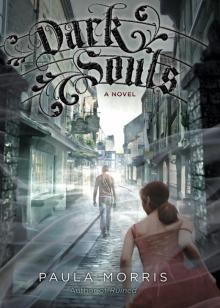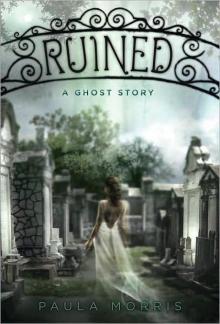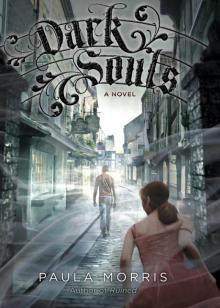- Home
- Paula Morris
Ruined Page 9
Ruined Read online
Page 9
From the hook behind her bedroom door, Rebecca pulled out her pale blue suede jacket; she tugged on a pair of jeans and the gray cashmere sweater she bought at the last J.Crew sale. She stuffed her phone, keys, and a tight bundle of cash into her jacket pockets, just in case: There was no need for a bag. Maybe she could take some photos on her cell phone and send them to her father or to her friends; maybe she could even take a picture of Anton. She had to do something to keep in touch with her New York friends: After just a couple of weeks away, Rebecca was only getting occasional texts and e-mails. Everyone was busy with school, busy with their lives. She wasn't part of that world anymore.
98
The wind blew the front door shut when she stepped onto the porch: It was blowing up from the river, bringing with it that strange, dirty New Orleans smell -- a little of garbage, a little of mold, a little of overripe fruit or a blossom rotting on the ground, overlaid with the tang of grease and sea. At this very moment, that wind was probably blowing Aunt Claudia's tarot cards all over Jackson Square.
Out of habit, on her way past the cemetery's open gates, Rebecca glanced in, just in case, hoping -- as ever -- to spot Lisette. It was usually closed on weekday afternoons, but today the gates were wide-open, a City Parks van parked on the central path.
And there she was, walking along the central pathway, her back to Rebecca.
"Lisette!" It was so long since Rebecca had seen her. Anton could wait: She had to talk to the ghost -- if that's what Lisette really, truly was.
The torn tail of her skirt dragging along the ground, her long black braid bobbing, Lisette turned off the path and disappeared behind a row of towering white vaults. Maybe she was headed for the Bowman tomb, Rebecca thought, jogging after her along a cracked concrete path. A small tour group was wandering out through the Washington Avenue gate, pointing at the bold striped awning of Commander's Palace restaurant. There was nobody else around, apart from a groundsman wearing soundproof earmuffs and swinging a power trimmer, oblivious to Lisette's presence, nodding at Rebecca as she passed.
Approaching the Bowman tomb, Rebecca- jumped over a wizened tree root; she skidded to a halt on the worn grassy
99
path and stepped over the low rusted railings, looking for Lisette. Her friend was huddled at the back of the tomb, just the shards of her skirt visible from the pathway.
"I've been looking for you!" Rebecca exclaimed, clambering around the vault. Untouched by the weak, late-afternoon sun, its sheer sides were cold to the touch.
Lisette shrugged, and gazed down at her bare feet.
"I've been around," she said. She sounded listless, Rebecca thought. It had to be quite boring, being a ghost. There was nothing to do in the cemetery except maybe talk to other ghosts and hear the same tour guides tell the same stories, day after day.
"Do you get sick of it?" Rebecca leaned against the side of the tomb, arms folded, the wind licking her hair. "Sick of being a ghost, I mean."
"Most of the time, not much happens," Lisette admitted.
"Are there other ghosts for you to talk to?"
"In the cemetery? Not as many as you'd think. Along by the river -- now there's a place to see ghosts. Mean ones, mainly. Mad and mean. A lot of them have been drunk for two hundred years. And the Quarter is full of ghosts as well. Right along Claiborne Avenue. In Faubourg Tremé, Faubourg Marigny -- ghosts everywhere."
"I wish I could see them," Rebecca sighed. Lisette moved over, making room for her, and she sat down next to her on the stone steps.
"Just get someone to murder you and then cover up your death." Lisette gave an arch smile. "You'll see other ghosts all the time."
Rebecca smiled back, wanting to ask how Lisette died, but
100
the question seemed so rude. And what if Lisette didn't like talking about it? What if there was some kind of ghost etiquette Rebecca didn't understand?
"Anyway," Lisette said, shrugging. "You can see me. And when you hold my hand, like you did that night in here, you can see what I can see."
"Really?" Rebecca couldn't believe this. "So why didn't I see the other ghosts in the cemetery?"
Lisette held up one finger.
"Ghost. There's just one of them here, apart from me. He's a gravedigger -- was a gravedigger. He's over there, by the firemen's tomb. We can go over and see him sometime, if you like. He never leaves that corner of the cemetery. If I get really lonely, I go and talk to him, but all he does is sing old songs and tell stories about the old days."
"When did he die?" This was a test: Rebecca wanted to see if Lisette stumbled over the answer at all.
"Nineteen-ten. He was moving a body into one of the vaults, and someone hit him on the back of the head with a shovel."
"A grave robber?"
"Maybe. Someone he owed money to, that's what he thinks. It wasn't his time to die, anyway. That's why he's still haunting the cemetery."
"Rather than some house, you mean?" Rebecca was trying to work out ghost-world rules.
"You don't choose where you haunt." Lisette gave a tired sigh, barely louder than a breath. "The place has to mean something. It has to relate to your life and your death. That's what I think, anyway, judging from the other ghosts I've met,
101
and what I know of the places my feet lead me. The places I can't get away from."
"When you saw me that first night in the cemetery, how did you know I wasn't a ghost?"
Lisette laughed softly, shaking her head.
"Ghosts can't get lost," she said. "And they don't say 'ouch' when they fall over!"
Lisette bent down over her knees, smoothing her thin, almost threadbare skirt. One of her sleeves was ripped so badly it hung off her shoulder, and there was something that looked sticky and dirty at the back of her head, under her hair -- a dark wound, perhaps, the hair over it matted and thick.
"Of course," Lisette continued, "I won't be a ghost forever." She sat up and looked at Rebecca, her pretty face frowning.
"How does it end?"
"Once the curse is broken," Lisette told her. Her face relaxed, its worried creases disappearing. "Then I'll be able to rest in peace. You won't see me anymore."
"The curse?" Rebecca sat up straight. The stone was too cold for nonghosts to sit on, she decided, scrambling to her feet. "I heard about a curse on the Bowman family -- or on their house or something. Is that what you're talking about?"
Lisette looked around, the way Amy and Jessica had glanced nervously around the lunchroom the day Rebecca asked them the same question.
"It's such a long story," Lisette said. She stared up and down the next line of tombs, starting the way Marilyn the
102
cat did when she heard something in another room. "Someone's coming."
Rebecca listened: Lisette was right. She could hear footsteps, girls talking. She took a step down, hemmed close to the tomb by its miniature iron fence.
"Do you think ..." Rebecca began, turning back to talk to Lisette: But the ghost girl was gone. Just like that, she'd disappeared off somewhere -- why, Rebecca didn't know. If only she'd taken Rebecca's hand, they'd both be invisible right now. Instead, Lisette was nowhere to be found, and Rebecca ... well, she was clearly, completely, totally visible.
And standing in the grassy alley, looking extremely startled, were Helena Bowman and Marianne Sutton. They were both still in their school uniforms, Helena clutching a perfect posy of waxy white flowers.
"What are you doing here?" Helena sounded outraged. "How dare you climb all over my family's vault?"
"I'm not ... I'm just -- sorry." Rebecca lumbered over the boundary fence, almost losing her balance and knocking her elbow against the neighboring tomb. She'd never thought that Helena or anyone else might visit this place during the day, but of course they did: Their family members were buried here. Helena must be bringing fresh flowers to leave at the gate of the tomb. "I was just looking around."
"Then take a tour." Marianne gr
ipped Helena's arm as though her friend needed propping up. Helena was looking wan, and a little frail, with dark circles under her eyes. "This isn't a playground! People are buried here, you know."
Rebecca hated being caught like this: There was nothing she could say to explain why she was on the wrong side of the
103
railing, and she'd already apologized. Something in the tone of their voices made her reluctant to apologize again.
"I have to go," she said, and clambered onto the pathway, weaving to avoid bumping into Helena. She walked away as quickly as she could without running, before either of them could say another word. Rebecca might be late to meet Anton, but she didn't want Marianne and Helena to see her running. She didn't want them to think they'd scared her away.
104
***
CHAPTER FOURTEEN
***
Anton was waiting for her: he seemed relieved rather than annoyed when Rebecca ran up, burbling her vague excuses. How could she tell him the truth -- that she'd spotted a ghost in the cemetery and darted in for a quick chat, only to be turfed off the Bowman family grave by Anton's BFFs, Helena and Marianne? It was easier to say she'd had to stay late at school.
"The last two streetcars have been full. Some car-dealer convention," he told her. "Like they have anything to celebrate! Do you want to just walk?" "Sure!"
"The only thing is, it's about three miles to the park, so I don't think we'll make it all the way. I can't stay out too ... "
He didn't finish his sentence, and Rebecca didn't press him. They weren't supposed to be out together, end of story. Today they were both in disguise, in their civilian gear: Anton had traded his St. Simeon's blazer for a brown MAKE LEVEES, NOT WAR T-shirt and an American Eagle hoodie, so
105
he almost looked like a normal teenage boy rather than some Patrician heir.
They strolled along the center of the broad avenue, walking down the disused streetcar tracks -- a sandy lane rimmed with grass lush from all the rain. Joggers thudded past them, some of them running in chattering pairs, some pulling dogs on leashes. Anton pointed out the plastic beads dangling high in the oak trees, relics of this year's carnival parades.
"The parades run along -- what is it, the south side of the street?" Rebecca asked him, trying to get her bearings.
"The river side," he corrected her. "And over there is the lake side, and what we're walking on right now is called the neutral ground. North and south don't mean much here. Most of the West Bank isn't really to the west of us at all, because of the way the river curves. And now, though we're really following the river, we're walking into Uptown -- and it's called that because it's upriver of the Quarter."
"Confusing," she told him, and he shrugged: He was used to this, she guessed, having never lived anywhere else, but Rebecca had grown up in a city where streets were on a grid. "Are you a member of Septimus? Do you get to sit on a float?"
"Ride," he said, grinning at her. "I'm not a member, but my father and grandfather are, and I usually ride on one of the floats."
"Usually?"
"OK -- always." He leaned toward her and lowered his voice. Rebecca's heart started thudding; she hoped Anton couldn't hear it. "Don't tell any of your cool New York
106
friends, but for years I was one of the pages, riding with the king. I had to wear a blond wig and white satin pantaloons." "Nice!"
Anton told her more about the Septimus parade, in between pointing out some of the more grandiose mansions lining St. Charles Avenue; a number of them were in the process of being decorated for Christmas. Outside one austere, sprawling stone place, men wrapped skeins of fairy lights around the wrought-iron fence, securing them in place with large red bows. Another house, he told her, was famous for filling its entire front lawn every December with hundreds of pots of white poinsettias.
Septimus, she discovered, was an all-male krewe, like the vast majority of old-line organizations. The only women in the parade were the queen -- always young, always a debutante -- and her maids, who wore elaborate beaded costumes so heavy and tall the girls had to be roped into position on the floats. Septimus differed here from some of the other krewes: The maids in Septimus were usually younger girls, not other debutantes. So both Marianne and Helena would be maids this year, riding on the same float. Rebecca made a mental note to skip the parade. She had enough of being looked down on by those two at school.
"And old-line means?" she asked.
"That it started just before or after the Civil War," he said, scuffing at the soft ground with one shoe. "In the nineteenth century, anyway. But when people talk about 'old-line' this and that, they usually mean the families. Everything here is about family."
"So I understand." Rebecca sighed.
107
"But it's all so ... the thing is," he said, his expression earnest and intent, "it's kind of ridiculous. Everyone prides themselves on being one of the 'old-line' families. But none of us are really from here. When the Garden District was laid out, it attracted the newcomers to the city, the people who weren't part of old New Orleans -- that is, the French-speaking, Creole-Catholic part. My great-great-great-whatever grandfather, the one who built the house we live in?"
"Yes?"
"He was a coffee trader who'd been living all over the Caribbean. But he was born in London and grew up in New York. And the Bowmans were originally the Baumanns from Boston -- they were German. Protestants, like most of the people who moved into the neighborhood. The Suttons were Irish immigrants originally. Everyone rich and successful, of course -- cotton brokers, or bankers, or big-time merchants. But they were outsiders once as well, and a lot of them were self-made millionaires. In other words, not exactly old money."
"You know a lot about the history of the place," Rebecca told him. The wind blew grit into her mouth, and strands of hair lashed her face; she wished she'd tied it back. But she didn't want the walk to end or for Anton to stop talking.
"It's who we are," he said, speaking so quietly she almost missed it. He looked at her, his dark eyes serious. "If it's so important to people, they should at least know the truth. Most of the black people in this city have got longer lineages than we have. They're the descendants of slaves."
"Or the free people of color," Rebecca reminded him, glad she knew something of the city's history.
108
"Absolutely." He smiled at her. "Or the people who moved here from Haiti or other places in the Caribbean. They were all here before us. If Katrina showed us anything, it was how easily what people have built here can just disappear."
Rebecca thought of Lisette's house on the other side of town, flooded and damaged by the wind.
"So what I'm saying is -- I'm a New Yorker, too!" Anton nudged her with his elbow.
"An outsider," she said with mock solemnity. Maybe this was why he seemed to like her, she thought: He didn't want to be part of the in-crowd. He knew a lot about his family history, but something in the tone of his voice suggested it oppressed him. He didn't sound proud or arrogant at all.
"I don't belong here any more or less than you do," he agreed.
"But not really--right?" They stopped while a car cut across the tracks, making a turn onto the other side of St. Charles. "You guys have all known each other forever."
"Like you and your friends, probably."
"Except I met my friends at school. Their parents didn't know my parents. They didn't all go to the same colleges and work in the same businesses and marry each other."
"See this?" Anton pulled the silver cigarette lighter out of his pocket and handed it to her. Rebecca pretended to be surprised: She didn't want him to know she'd seen it before, when she was spying on him in Lafayette Cemetery. "It was a wedding gift from my great-aunt to Helena's great-grandfather. They got married in I925-"
"And you carry it around with you ... because you're a smoker?" Rebecca made a face.
109
Nope.
"Becau
se you plan to give it to Helena on jour wedding day?" she teased, feeling herself blush. Now it was Anton's turn to make a face: Helena might be part of his group, but obviously she wasn't the girl of his dreams. "If that's even legal," she added hastily.
"Anything's legal in Louisiana," he told her. "If you know the right people. Actually, I don't really know why I carry it around with me. I just do."
"It's a beautiful thing," Rebecca told him, stroking the lighter: It was warm to the touch, etched with a delicate fleur-de-lis pattern.

 Dark Souls
Dark Souls The Eternal City
The Eternal City Unbroken
Unbroken Ruined
Ruined Ruined 2 - Dark Souls
Ruined 2 - Dark Souls